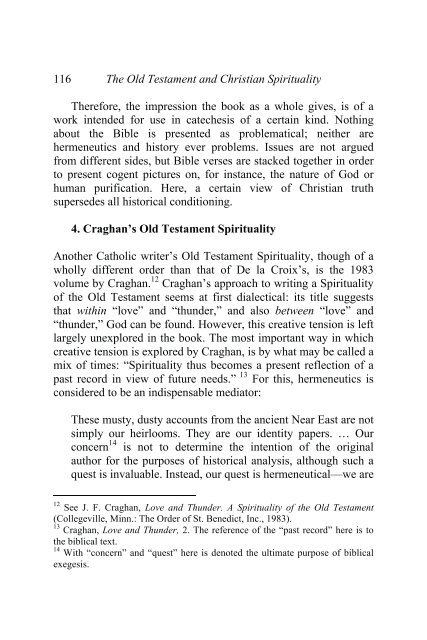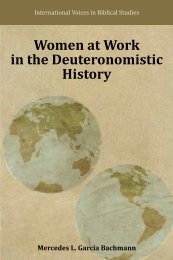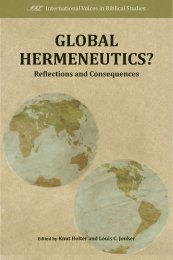The Old Testament and Christian Spirituality - International Voices in ...
The Old Testament and Christian Spirituality - International Voices in ...
The Old Testament and Christian Spirituality - International Voices in ...
You also want an ePaper? Increase the reach of your titles
YUMPU automatically turns print PDFs into web optimized ePapers that Google loves.
116 <strong>The</strong> <strong>Old</strong> <strong>Testament</strong> <strong>and</strong> <strong>Christian</strong> <strong>Spirituality</strong><br />
<strong>The</strong>refore, the impression the book as a whole gives, is of a<br />
work <strong>in</strong>tended for use <strong>in</strong> catechesis of a certa<strong>in</strong> k<strong>in</strong>d. Noth<strong>in</strong>g<br />
about the Bible is presented as problematical; neither are<br />
hermeneutics <strong>and</strong> history ever problems. Issues are not argued<br />
from different sides, but Bible verses are stacked together <strong>in</strong> order<br />
to present cogent pictures on, for <strong>in</strong>stance, the nature of God or<br />
human purification. Here, a certa<strong>in</strong> view of <strong>Christian</strong> truth<br />
supersedes all historical condition<strong>in</strong>g.<br />
4. Craghan’s <strong>Old</strong> <strong>Testament</strong> <strong>Spirituality</strong><br />
Another Catholic writer’s <strong>Old</strong> <strong>Testament</strong> <strong>Spirituality</strong>, though of a<br />
wholly different order than that of De la Croix’s, is the 1983<br />
volume by Craghan. 12 Craghan’s approach to writ<strong>in</strong>g a <strong>Spirituality</strong><br />
of the <strong>Old</strong> <strong>Testament</strong> seems at first dialectical: its title suggests<br />
that with<strong>in</strong> “love” <strong>and</strong> “thunder,” <strong>and</strong> also between “love” <strong>and</strong><br />
“thunder,” God can be found. However, this creative tension is left<br />
largely unexplored <strong>in</strong> the book. <strong>The</strong> most important way <strong>in</strong> which<br />
creative tension is explored by Craghan, is by what may be called a<br />
mix of times: “<strong>Spirituality</strong> thus becomes a present reflection of a<br />
past record <strong>in</strong> view of future needs.” 13 For this, hermeneutics is<br />
considered to be an <strong>in</strong>dispensable mediator:<br />
<strong>The</strong>se musty, dusty accounts from the ancient Near East are not<br />
simply our heirlooms. <strong>The</strong>y are our identity papers. … Our<br />
concern 14 is not to determ<strong>in</strong>e the <strong>in</strong>tention of the orig<strong>in</strong>al<br />
author for the purposes of historical analysis, although such a<br />
quest is <strong>in</strong>valuable. Instead, our quest is hermeneutical—we are<br />
12<br />
See J. F. Craghan, Love <strong>and</strong> Thunder. A <strong>Spirituality</strong> of the <strong>Old</strong> <strong>Testament</strong><br />
(Collegeville, M<strong>in</strong>n.: <strong>The</strong> Order of St. Benedict, Inc., 1983).<br />
13<br />
Craghan, Love <strong>and</strong> Thunder, 2. <strong>The</strong> reference of the “past record” here is to<br />
the biblical text.<br />
14<br />
With “concern” <strong>and</strong> “quest” here is denoted the ultimate purpose of biblical<br />
exegesis.




